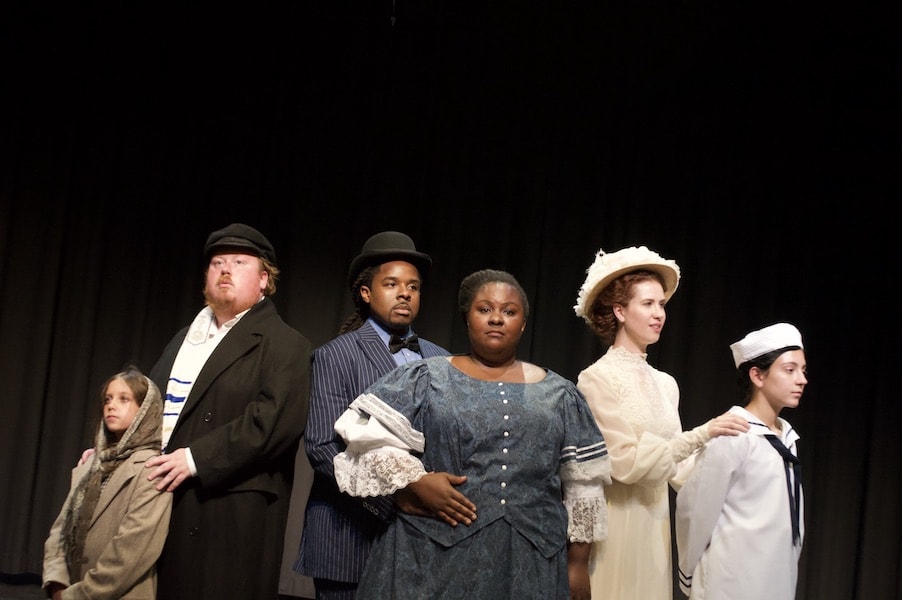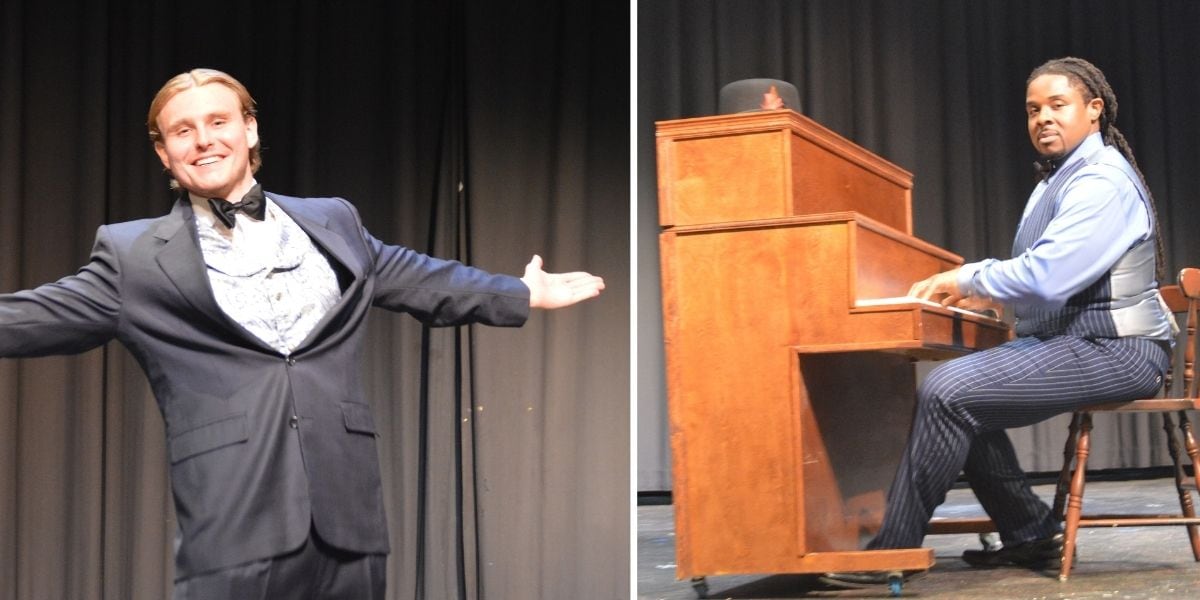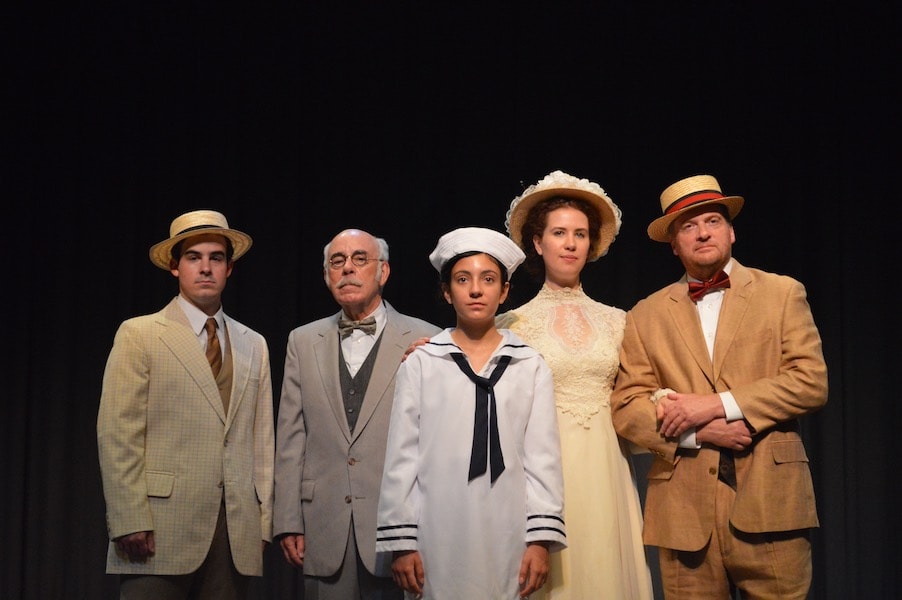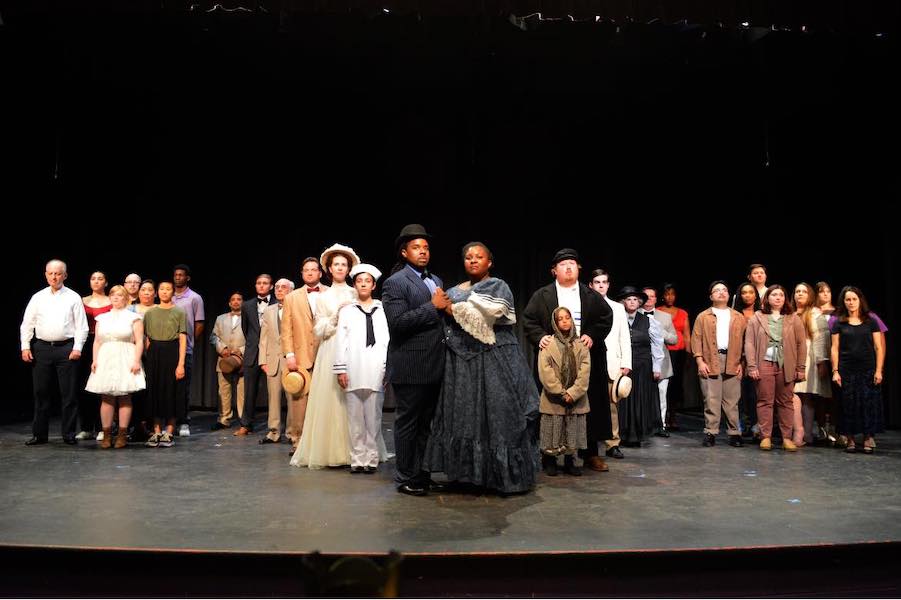Since its 1996 debut in Toronto, the musical Ragtime has had a history of lavish productions — and the Sterling Playmakers have honored this tradition. The visual richness of this production echoes the sweeping ambitions of the show’s story, which follows three groups — African Americans, upper-class whites, and Jewish immigrants — as they navigate racial and cultural unrest in turn-of-the-century New York, and come to understand that the “American Dream” is not as universally available as it pithily suggests. The Sterling Playmakers’ production showcases costume design on an enormous scale, an extensive cast, and a full orchestra that pulls off a variety of musical styles with ease as it tells a timely tale about revolution and evolution amid tragedy and triumph.

The show’s visual excellence is one of its strengths, under Jonathan Mulberg’s direction: Costume Designer Kathy Dunlap and Costume Crew artist Kati Andresen have created seemingly hundreds of costumes for the show’s city’s worth of characters (the show seeks to depict the vast diversity and density of New York). Some individual costumes are on display for only a moment, it seems — and this loving attention to detail is felt and appreciated throughout. Set Designer Bill Fry and Set Construction crew Bill Fry, Kimberly Fry, Laura Garofolo, Stacy Marsh, Scott Ruegg, and Mylo Schmidt have created in fantastic detail, a to-scale Model T, which can roll on and off the stage. The Model T reminds one of the barricade in Les Mis — a fabulously constructed, iconic set piece of symbolic value to the show.
While the Statue of Liberty painting attached to the back wall of the stage is a bit lacking in artistry, the starred-and-striped-bunting-adorned railing in front of it is meant to simulate the deck of a boat, and the stage’s central platform design effectively serves the narrative and makes Jolene Vessette’s choreography even more meaningful. For example, when the character Sarah sits in the attic to isolate from her husband Coalhouse Walker Jr., out of the stage lights in secluded silence, her story feels all the more poignant.

This production showcases several standout performances: Kareem Taylor portrays central character Coalhouse Walker Jr. — a pianist from Harlem whose story arc sends him from moments of jubilation to tragedy, and back again, alongside the struggles of his wife, Sarah, played by Ahryel Tinker. Taylor displays exceptional singing ability and captivating emotional range to go above and beyond what the role requires, and Tinker’s aloof acting perfectly fits the battle-worn Sarah.
Jim Bowen-Collinson plays Jewish immigrant and optimist-about-the-American-Dream-turned-cynic-turned-successful-filmmaker-and-optimist-again Tateh, whose performance, alongside wonderful child actor Annabel Stein as Tateh’s young daughter, is utterly charming and convincing — his acting and singing are excellent. (So excellent, in fact, that his mic might need to be turned down to accommodate his impressive projection.) Meanwhile, Abbie Mulberg plays Mother — who narratively represents the story’s upper-class white population — and exercises a stiff yet graceful physicality and line delivery style perfect for the role, accented by her white dress, designed in a way that wonderfully serves her performance: with all its intricate lace, it feels delicate and set in its ways, distant in its beauty and not to be touched. While Mother evolves as a character, she frequently acts charitably, but with racist undertones, which serves well one of the show’s messages: even those who view themselves as “good guys,” or who others view in that way, are still flawed and are never done growing.
Many of these actors are taking their assignments and running with them excellently — they fully embody the characters’ individual struggles and worries, being not only believable but enthralling to watch. However, with the exception of showing in vivid detail the horrors of police brutality in moments during the Coalhouse-Sarah arc — which is heart-wrenching in itself, and was unusual for mainstream theater in the late ’90s — the show struggles to comment on the challenges faced by marginalized groups in the United States in a way that offers new topics or angles for consideration. Ragtime serves as a time capsule for what new stories about race and bigotry looked like before the movements of the last two and a half decades — a conversation starter on what commentary on racism looked like before similar approaches became more common in our media landscape.

Ragtime offers viewers a deep emotional connection with Coalhouse and his wife Sarah and the struggles they must endure, but the time it spends on its other characters feels less involving — even Taylor and Tinker’s engrossing performances can’t fix this.
It feels predictable that Tateh will succeed, and it does not feel likely that Mother’s upper-class white world will be upended in any way. A good half of the show feels significantly less compelling than the half that centers Coalhouse and Sarah. Given how sparsely their arc is sprinkled into the script, which seeks to straddle the stories of this enormous cast of characters, the show has the feel of a revue rather than a plot-based musical. The New York Times theater critic Ben Brantley hit the nail on the head when he said in 1998 that the show feels like “a diorama.” The show, packed with large clusters of groups of characters from different communities, and historical characters who seem like they’re only on stage for a moment and have little to no effect on the broader narrative, feels like it’s trying to say too much at once and as a result, doesn’t say enough.

The Sterling Playmakers have risen to an enormous challenge of depicting this “musical of epic proportions,” as Mulberg correctly writes in his Director’s Notes. This production of Ragtime, a show on the narrative and visual scale of Les Mis, is a wonderful surprise to see performed on a high school auditorium stage. The Sterling Playmakers have pulled off this commendable achievement with enormous skill and a clear love of the source material, as well as knowledge of and respect for the timeliness of the story. Tragically, these same issues of bigotry, nativism, and police brutality depicted in this show about our country over a hundred years ago still plague us today — and the Sterling Playmakers’ production of Ragtime is a needed reminder of the human impact of hatred.
Running Time: Approximately two hours 30 minutes, with one 15-minute intermission.
Ragtime plays two more weekends — August 5 to 7 and August 12 to 14, 2022 — presented by Sterling Playmakers performing at Potomac Falls High School, 46400 Algonkian Pkwy, Potomac Falls, VA. For tickets ($20 general admission), buy them at the door or purchase them online.
The Ragtime cast and production credits are online here.
COVID Safety: Masks are recommended but not required.




